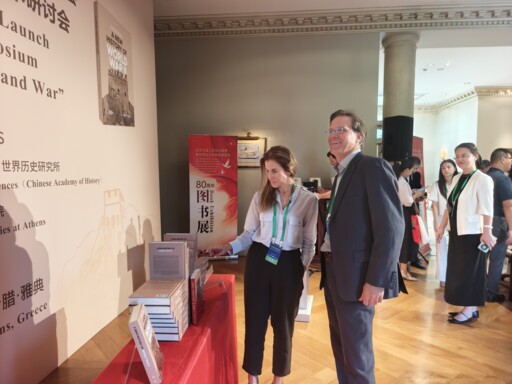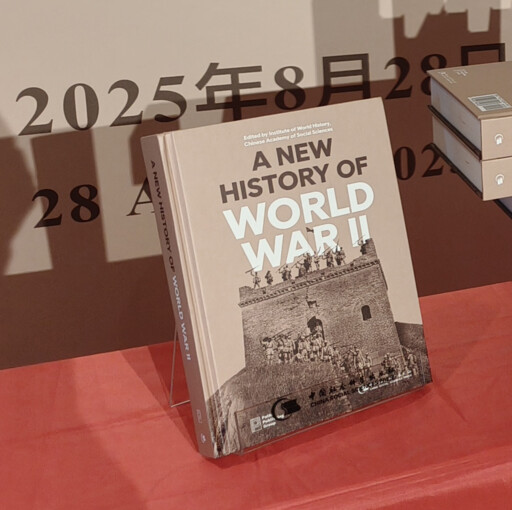


New history of WWII stresses shared global struggle against fascism

Attending scholars at the book launch Photo: Yang Xue/CSST

A New History of World War II on display at the book launch Photo: Yang Xue/CSST
ATHENS—On Aug. 28, the book launch of A New History of World War II, compiled by the Institute of World History (IWH) at the Chinese Academy of Social Sciences, was held in Athens, Greece, alongside an international academic symposium titled “Rebirth from the Ashes: Civilization and War.” Scholars in attendance engaged in in-depth discussions on the global impact of WWII, China’s role as the main Eastern battlefield, and the historical experiences of both China and the West.
China as main Eastern battlefield
Ivona Ladjevac, deputy director of the Institute of International Politics and Economics in Serbia, highlighted China’s pivotal role in WWII. “For most people in Europe… WWII started with the German invasion of Poland, but actually it started with the Japanese aggression against China. On Sept. 18, 1931, the Chinese people fired the first shot against fascist expansion, a full eight years before WWII formally began in Europe.”
Emphasizing China’s strategic importance, she noted that its resistance “tied down more than a half million Japanese troops… and in doing so China played the key role in weakening the fascist war machine long before the Allies landed in Normandy or American forces entered the Pacific theater.”
Ladjevac further stressed the global significance of this struggle: “It forged international alliances… and drew the world’s attention to the atrocities committed by the fascist regimes.”
Liu Zuokui, director-general of the IWH, observed that in recent years, historical revisionism and nihilism have been spreading in international academia, seriously distorting public understanding of WWII. Some even attempt to whitewash or justify acts of aggression, which not only wounds the feelings of victimized nations but also undermines the postwar international order and peace.
Through A New History of World War II, we hope to further reinforce the consensus that the victory of the World Anti-Fascist War was the result of the joint struggle of peoples worldwide, and that both the Chinese and European battlefields made decisive contributions, Liu said. It is crucial to protect the legacy of WWII, preserve the UN-centered international order, and work toward building a community with a shared future for humanity.
Richard Overy, a professor of history from the University of Exeter in the United Kingdom, also emphasized the significance of A New History of the Second World War.
“For so long Western accounts of WWII have generally sidelined China, while most of the focus has been on victory in Europe and in the Pacific,” Overy elaborated, adding that without China’s resistance against Japanese aggression, it “might indeed have led to a longer war, a more difficult war for the Americans fighting in the Pacific.”
Overy pointed out that the war also encompassed popular resistance organized by the CPC—an important dimension often neglected in Western accounts. This book, he said, helps correct misunderstandings about the timeline, scope, and nature of WWII, effectively integrating China’s experience into the global narrative and offering a fuller, more balanced historical perspective.
Comparative perspectives encouraged
Athanassios G. Platias, a professor of international and European studies at the University of Piraeus in Greece, underscored the important role of historical narratives in shaping both national and global identities. He noted that A New History of World War II challenges the long-standing Eurocentric narrative and highlights the significance of the main Eastern battlefield.
At the same time, he noted that Greece’s wartime experiences and the active resistance of its people demonstrate courage and resilience, providing valuable insights into the complexity of wartime life and the endurance of societies under pressure. Greece’s strategic position and resistance not only tied down Axis forces but also provided crucial intelligence to the Allies, and its wartime experiences had a profound impact on the postwar political landscape.
“China’s war of resistance against Japanese aggression should not only be seen as part of Chinese history but also understood within a global historical framework,” remarked Stelios Virvidakis, a professor of philosophy from the National and Kapodistrian University of Athens. He argued that only by taking a comparative approach to history can we truly appreciate the experiences and resilience of different nations during shared catastrophes, fostering mutual understanding with a more inclusive perspective.
In Virvidakis’ view, history is not merely a chronicle of events but a reflection on shared human experiences. Therefore, maintaining objectivity while respecting the facts remains a constant challenge in scholarly research.
Editor:Yu Hui
Copyright©2023 CSSN All Rights Reserved